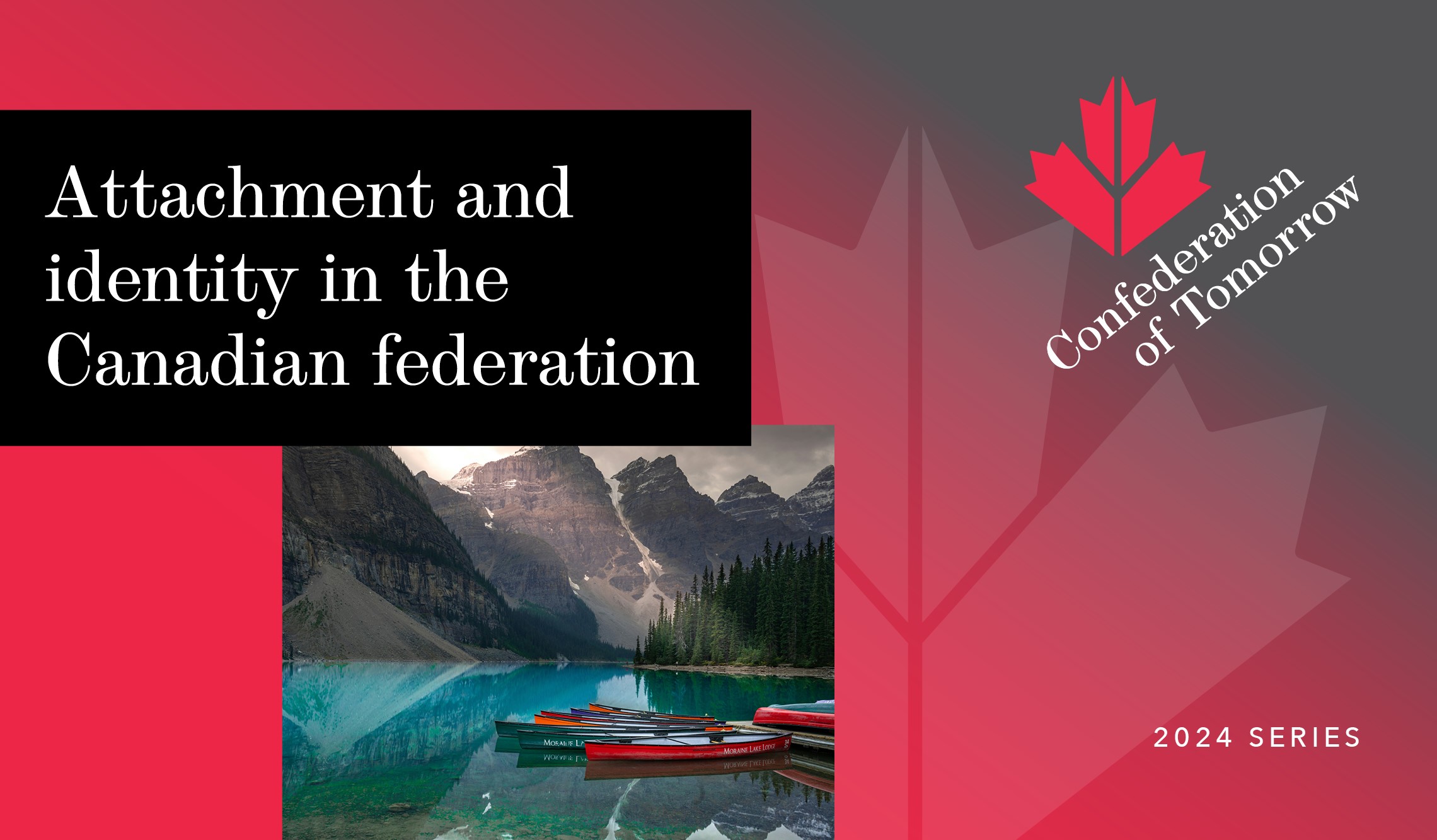Attachment and identity in the Canadian federation

Attachment and identity in the Canadian federation
The annual Confederation of Tomorrow surveys explore the relationships between different types of identity. It asks about attachment to and identification with Canada and one’s province or territory; it also asks Indigenous Peoples about their attachment to their Indigenous nation or community. It considers whether Canadians feel their identities are respected by others or whether they feel pressure to downplay them.
In general, the survey confirms that identities in Canada are not zero-sum: national and regional or cultural identities tend to overlap, meaning that most people express multiple identities rather than selecting only one over others. It also finds that community identities remain stronger among Quebec francophones and Indigenous Peoples, without necessarily excluding an attachment to Canada. Despite persistent frustrations with the way the federation works, in most regions (the main exception being Ontario) the proportion that identities first or only with their province has declined to some extent over the past several years.
Most Canadians agree that expressing their cultural identity is important to their overall well-being and happiness, and most also agree that their cultural identity is respected in Canada today. But one in four also say they feel pressure to hide or downplay their cultural identity. Indigenous Peoples stand out as feeling even more constrained in the expression of their identity: one in two agree that they feel pressure to hide or downplay their cultural identity. Recent immigrants are also more likely than average to say they feel this kind of pressure. In the case of both Indigenous Peoples and immigrants, the proportions that feel pressure to hide their identity is highest among those in the youngest age group.
Key findings
- Most Canadians feel attached to both Canada and to their province or territory. Most Indigenous Peoples in Canada also feel attached to both their Indigenous nation or community and to Canada. In general, these different attachments overlap.
- In Quebec, and Newfoundland and Labrador, as well as in each of the three territories, residents are more likely to feel very attached to their province or territory than to feel very attached to Canada.
- Older Canadians are more likely than their younger counterparts to say they feel very attached to Canada. And in every region, the same pattern holds regarding strong feelings of attachment to one’s province or territory. The difference between the extent to which the oldest and youngest age groups feel very attached to their province is largest in Quebec and the Prairies.
- Across the country as a whole, a majority defines themselves as a mix of Canadian and someone from their province.
- In only two provinces – Quebec, and Newfoundland and Labrador – does the proportion identifying mostly with their province exceed the proportion identifying mostly with Canada.
- The proportion defining themselves as someone from their province first or only has declined to some extent since 2019 in most provinces, with the exception of Ontario. The drop is more dramatic in Newfoundland and Labrador. In that province, the proportion defining themselves as a Canadian first or only has doubled over the same period.
- Most Indigenous Peoples express a mix of Indigenous and Canadian identities, rather than defining themselves as either only Indigenous or only Canadian.
- One in two First Nations people living on-reserve identify as an Indigenous person first or only.
- Most Canadians feel it is important to express their cultural identity, and most say they have enough opportunities to do so. Yet, some also feel pressure to hide or downplay their identity.
- Francophones in Quebec, as well as Indigenous Peoples, stand out as being more likely than average to agree that expressing their cultural identity is important to their well-being, but less likely than average to agree that their cultural identity is respected in Canada.
- Recent immigrants and Indigenous Peoples stand out as being much more likely to agree that they feel pressure to hide or downplay their cultural identity.
- In general, younger Canadians are more likely than their older counterparts to agree that they feel pressure to hide or downplay their cultural identity. But this age difference is much more pronounced among immigrants and Indigenous Peoples.
The Confederation of Tomorrow surveys give voice to Canadians about the major issues shaping the future of the federation and their political communities. They are conducted annually by an association of the country’s leading public policy and socioeconomic research organizations:the Environics Institute for Survey Research, the Centre of Excellence on the Canadian Federation, the Canada West Foundation, the Centre D’Analyse Politique – Constitution et Fédéralisme, the Brian Mulroney Institute of Government and the First Nations Financial Management Board.
The 2024 study consists of a survey of 6,036 adults, conducted between January 13 and April 13, 2024 (82% of the responses were collected between January 17 and February 1); 94% of the responses were collected online. The remaining responses were collected by telephone from respondents living in the North or on First Nations reserves.
For more information, contact Dr. Andrew Parkin or the Environics Institute for Survey Research.

This project benefits from the financial support of the Research Support Program of the Secrétariat du Québec aux relations canadiennes (SQRC) / Ce projet bénéficie de l’appui financier du Programme d’appui à la recherche du Secrétariat du Québec aux relations canadiennes (SQRC).

Like what you're reading? With our bi-monthly e-newsletter, you can receive even more with the latest details on current projects, news, and events at the institute.
Subscribe